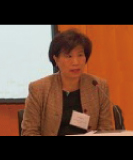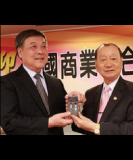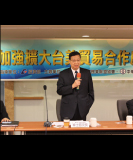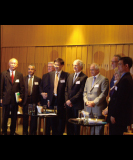You are browsing > Service Trade > Trade Info
Members discuss challenges and opportunities of online services trade amid COVID-19 crisisWTO
At a meeting of the Council for Trade in Services on 1 July, WTO members discussed their efforts to increase the digital capabilities of businesses and consumers in view of the growing importance of online services, especially during the COVID-19 crisis. They also raised specific trade concerns related to transparency, 5G communications networks, pre-installed software, satellite operators and cybersecurity.
The international trading system has become increasingly services-oriented, with online services becoming particularly important during the COVID-19 pandemic. In response to this trend, a dozen WTO members proposed a discussion, in the context of the Work Programme on Electronic Commerce, on how governments are helping businesses and consumers increase digital capabilities while seeking to address the digital divide. All members welcomed the proposal as a positive contribution to the e-commerce work programme.
The proponents suggested a discussion of the challenges and opportunities for digital services delivery and governments' activities aimed at achieving better digital inclusion. This includes providing assistance to micro, small and medium-sized enterprises (MSMEs) and developing countries so that they may increase their share of services exports.
Many developed countries presented their ongoing programmes for increasing digital capabilities in developing countries. Some developing countries underlined that improving connectivity, mastering digital tools, and enhancing international cooperation are essential to make the transition from being buyers to suppliers in international services trade.
Several developing countries highlighted the key role of e-commerce in supporting economic growth and development and in helping MSMEs, in particular, remain active during the crisis. They also mentioned several challenges, including infrastructural constraints and the need to have access to data. They pointed to the importance of government policies that help ensure the gains from online services trade are distributed more equitably across countries.
Members also discussed the COVID-19 pandemic and its implications for trade in services. Many delegations highlighted the importance of sharing experiences, including on trade-facilitating measures adopted to deal with the crisis and to promote economic recovery.
Several WTO members referred to a recent report issued by the WTO Secretariat, which highlighted a greater reliance on online services in sectors such as retail, health, education, telecommunications and audio-visual in the wake of the crisis. This is due to consumers developing new ways of coping with social distancing measures and to suppliers accelerating efforts to expand their online operations.
Many members noted that the crisis has underscored the urgent need to address disparities in digital connectivity. In reference to the moratorium on imposing customs duties on electronic transmissions, which members renewed in December 2019, the African Group said that the pandemic had further highlighted the importance of collecting tariff revenue on such transmissions.
Many members said that creating conditions conducive to trade in services, including open trade policies, will be key to bringing about a sustained and socially inclusive recovery from the COVID-19 crisis. They also stressed the need to avoid restrictions in areas such as cross-border data flows that could undermine economic recovery and the importance of services-related measures being put in place in a transparent manner.
New trade concerns
Australia's 5G-related measures
China raised concerns over Australia's measures on 5G telecom projects, arguing that these prohibit Chinese companies from participating due to unreasonable, non-transparent and discriminatory requirements. These measures violate the non-discrimination principle (also known as the “most-favoured nation principle”) and the transparency obligations in the General Agreement on Trade in Services (GATS) and Australia's GATS commitments, China said. It argued that they also undermined the business operations of Chinese services suppliers in Australia. China called on Australia to treat Chinese companies in an objective, just and fair manner.
Australia said that its 5G network requirements are fully consistent with WTO rules and that foreign companies are welcome in the country. Australia said it is the first time that it has heard concerns about this matter in the Council and reiterated its availability to engage with members in a constructive manner.
Russia's fixed satellite operators measure
The United States sought clarifications about a Russian measure concerning the allocation of radio frequency bands for foreign satellite operators, arguing that it violates Russia's relevant commitments under the GATS. Canada and the European Union echoed the US concerns.
Russia stated that it was not aware of the measure at issue having created any difficulties for foreign suppliers and emphasised that there have been no instances of Russian operators being prevented from using the services of foreign satellite operators.
Russia's software pre-installation measure
The United States raised a concern about a Russian measure on the pre-installation of software, noting that, although the measure had been previously discussed in the Council for Trade in Goods and the Technical Barriers to Trade Committee, it also had implications for services trade. The US claims that the measure violates Russia's GATS commitments in several services sectors, including computer and related services, telecommunications and audio-visual services. Canada, the European Union and Japan echoed the US concern.
Russia noted that the legislative process has taken into account the views of foreign service suppliers and stated that the measure at issue did not prohibit the pre-installation of foreign software, did not contain any discriminatory provisions and was consistent with Russia's GATS commitments.
Other trade concerns
China's cybersecurity measures
Japan and the United States reiterated concerns over China's proposed implementation of its Cybersecurity Law, including on matters related to data localization and security assessments on cross-border transfer of data. Japan said it is closely following how China is taking its comments into consideration, including the need for a level playing field in China for foreign and domestic operators. The United States shared Japan's concerns and asked China to update the Council on the status of the draft decree. These concerns were echoed by Canada, the European Union and Chinese Taipei.
China said that the purpose of its cybersecurity measures was to guarantee the security of critical information infrastructure and its supply chain and to safeguard its national security. China said it followed a transparent legislative approach by seeking comments from various stakeholders and taking them into consideration and would continue to do so in the future. It reiterated its willingness to engage on this matter and recalled that Japan and the United States also have laws on cybersecurity. It recalled its concerns regarding the relevant US Executive Order issued in May 2019 and called on the US to bring its measure in line with its commitments and obligations under the GATS.
Viet Nam's cybersecurity measures
Japan and the United States reiterated concerns about Viet Nam's draft cybersecurity measures, including on issues such as data localization, which they claim are negatively disrupting business for foreign operators. Canada, the European Union and Chinese Taipei echoed these concerns.
Viet Nam reiterated that it has followed a transparent process and kept an open mind by consulting with all relevant stakeholders.









